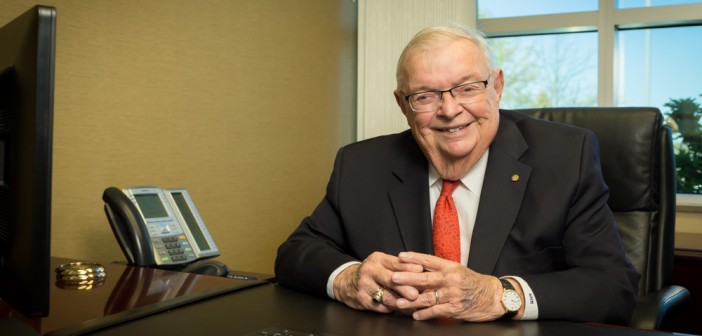William Moeller, Senior Vice President of Investments and Portfolio Manager at Raymond James in Grand Blanc, was once a 22-year-old investment analyst who in January of 1959, moved from Detroit to Flint. Little did he know, that move would make him part of Flint’s history – and change his life forever.
In those days, people would often work on Saturday mornings in addition to the work week, so one Saturday morning, Moeller set out on a mission. “Being brand new to Flint, I took a bunch of my business cards to the top of the Mott Foundation Building,” he begins. “I went into each office, gave them my background, just to see if I could be of service to them. I got to the floor where Mr. Mott’s office was. His door was open. I knocked on it, introduced myself, and told him what I was about, gave him my spiel.”
“Well, you must be new in town,” said Mr. Mott.
“Yeah, as a matter of fact, I am,” Moeller replied. “Why do you say that?”
“Most local investment people don’t think I do any of my investment business in town.”
“Do you?” asked Moeller
“No,” Mott responded. “Would you like to know why?”
“Yes, I would love to know.”
“Come on in,” Mott said.
That Saturday morning, Moeller talked with C.S. Mott for an hour and a half about everything – from Flint to investments, politics, and his thoughts on other miscellaneous topics.
“I never knew when I might get a call with that lunch invitation; but whatever I had going on that day, I would cancel to make sure I could go.”
“He was really kind to me,” Moeller shares. “I was impressed that somebody like him – with the wealth, the stature – would take time on a Saturday morning to talk with someone he had never met before.”
Within that first meeting, Mott had set up an appointment for Moeller with a professional acquaintance in Chicago, and arranged a train ticket to get him there. At that appointment, Moeller was able to learn about different types of investments and bonds. Moeller adds that Mott preferred revenue bonds, because they were backed by an asset; for example, Mott owned many bonds for the Mackinac Bridge. As there were no training programs back then, Moeller had to learn on-the-fly; and what better teacher than C.S. Mott?
“He was very helpful with those things,” says Moeller. “He taught me that you don’t sell things, you build relationships. You learn what people need and want.”
Moeller describes Flint in 1959 as a boomtown, a great place; and that C.S. Mott certainly had a significant influence on the city, noting that his legacy is everywhere you look in Flint, then and now.
“He was a pleasant person,” Moeller says. “He was straightforward. You knew you were getting a straight answer when you asked him a question. He was strong, personable, willing to listen. In my opinion, he was probably the greatest visionary I’ve known. He wasn’t afraid to voice his visions.”
An example is the community school program, which at the time, was the most unique in the entire country. In addition to that, C.S. and his son, Harding, advocated for UM-Flint to remain here, saving it when Governor Romney wanted to make it an independent college. “If it weren’t for Harding, UM-Flint wouldn’t be here,” Moeller adds.
Among Mott’s many endeavors, GM is, of course, one of the most notable chapters of his legacy. “He was very diplomatic, too,” says Moeller. “He got out of a lot of difficult situations, especially being on the GM board for 60 years. He dealt with challenges every day, and did it very well. People listened to him, and they knew he had given much thought to what he was saying.”
Moeller, who enjoyed hearing the history of “Old GM” during the time of Founder, Billy Durant, waited each month for the possibility of an invitation to lunch with Mott and a handful of people he relied on – his attorney, other Mott Foundation board members, and the occasional interlopers, like Moeller.
“It was a great joy for me,” he says. “About once a month, his personal secretary would call and say, ‘Mr. Mott would like to know if you’d join him for lunch today at the Michigan National Dining Room.’ There was a kind of ritual: first, we’d all go over to the office. He always went into the restroom and got a soup spoon, wrapped it in tissue, and put it in his pocket.” C.S. took the large soup spoon to lunch, according to Moeller, simply because he didn’t care for small soup spoons.
The group would then head down to the dining room, which was located in the Mott Foundation Building. “The chef was wonderful,” Moeller says. “All the meals cost 25 cents, so the first thing Mr. Mott did when we all sat down was say, ‘Everyone put down their quarter before we can order.’” Mr. Mott was known for being personally frugal, and would also buy certain newspapers over others, to save five cents.
As for the discussions at the lunches, Moeller describes it as a real privilege. “I didn’t say a lot,” he shares. “I just took it in.” The conversation ranged from Flint issues, to business in general, and even a little bit about Old GM.
“To Mott’s credit,” Moeller says, “We never discussed what was currently going on at GM, because he was a director and couldn’t legally talk about it. The people at the table were those he trusted completely. He had built great relationships with them. We’d meet for about an hour, then all of a sudden, he’d stand up and say, ‘Thank you for joining me.’ I never knew when I might get a call with that lunch invitation; but whatever I had going on that day, I would cancel to make sure I could go.”
Although Mott was a philanthropic and distinguished person, he also enjoyed activities like riding mopeds on Bermuda, which seems uncharacteristic; but Moeller believes it showed his fun side.
Mott’s vision for Flint was that of a great city, one that was going to grow. The C.S. Mott Foundation starting granting funds in other parts of the U.S., and even overseas. “He foresaw a lot of changes, not only in the auto industry, which is where he knew things the best,” says Moeller, “but also in the country and the direction it was heading with foreign policy, and the needs of people. He was always very cognizant of that.”
One lesson Moeller learned from C.S. Mott that he still heeds today is the importance of taking time for young people. “I’ve been in the investment business for 58 years, and I’ve had 30 interns,” he says. “C.S. really drove into me that it’s essential to spend time with young people, not be afraid to think outside of the box, to build relationships and be loyal to those relationships. The things I learned from him changed my life.”
Photography by Eric Dutro














